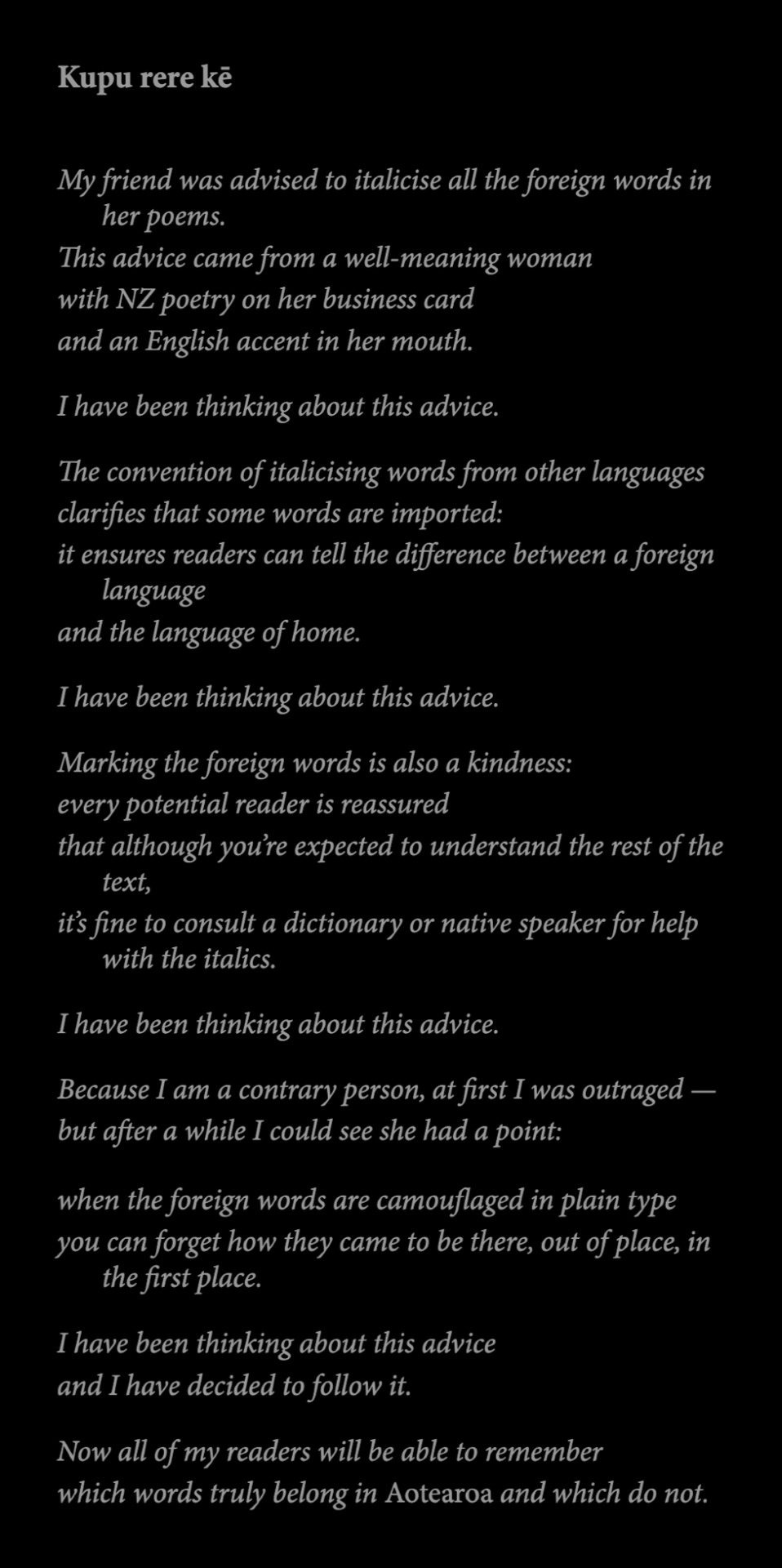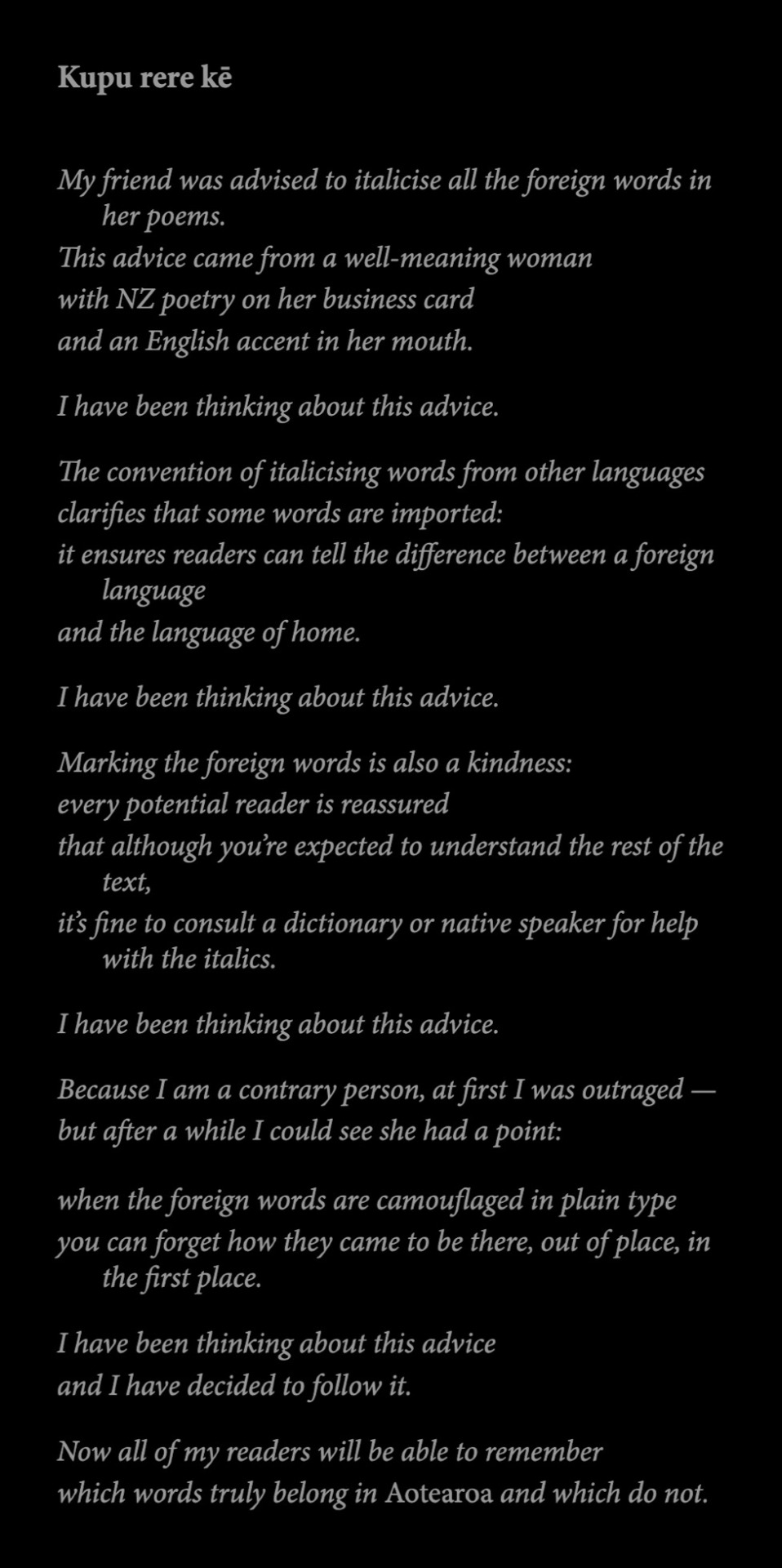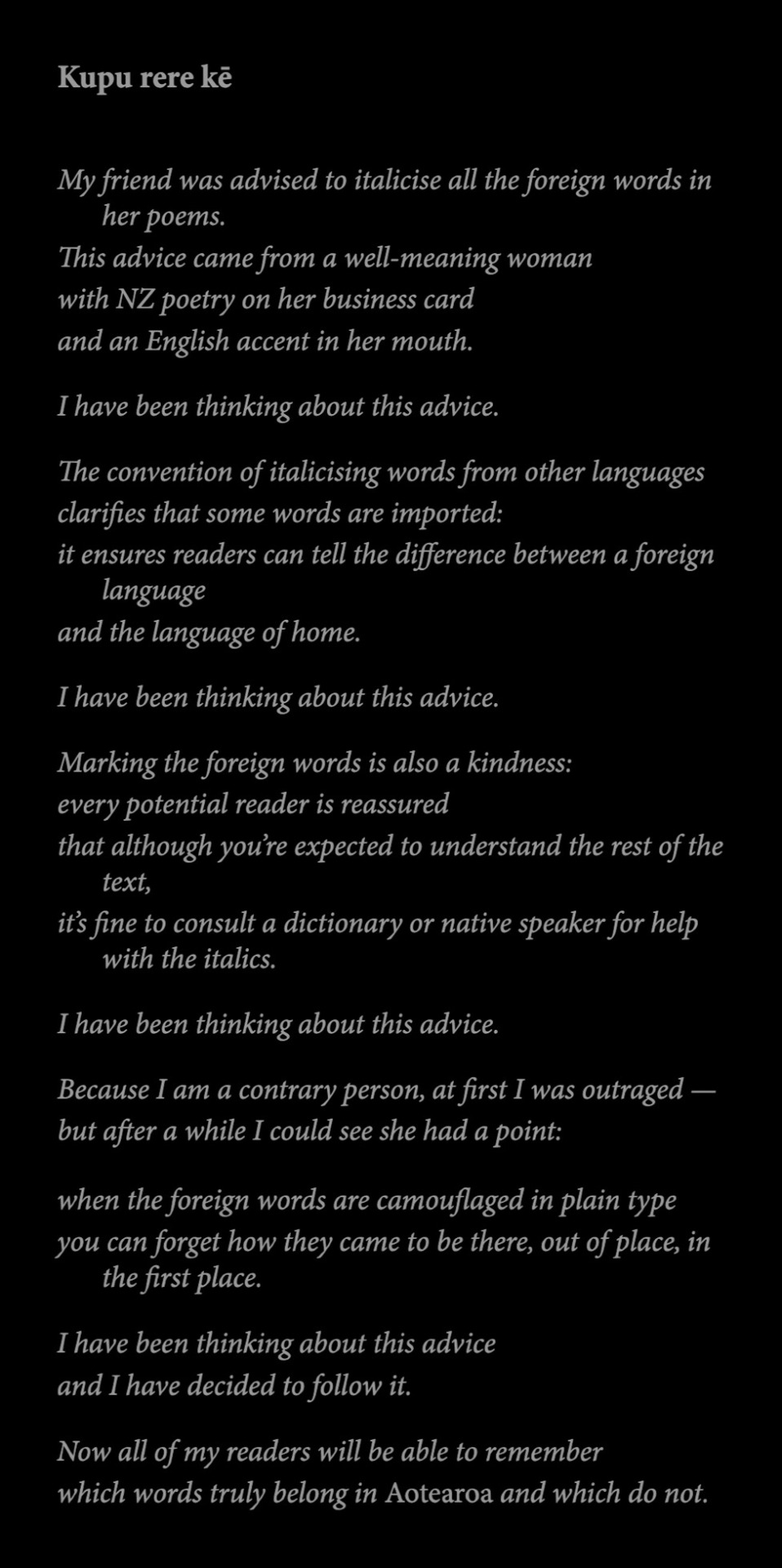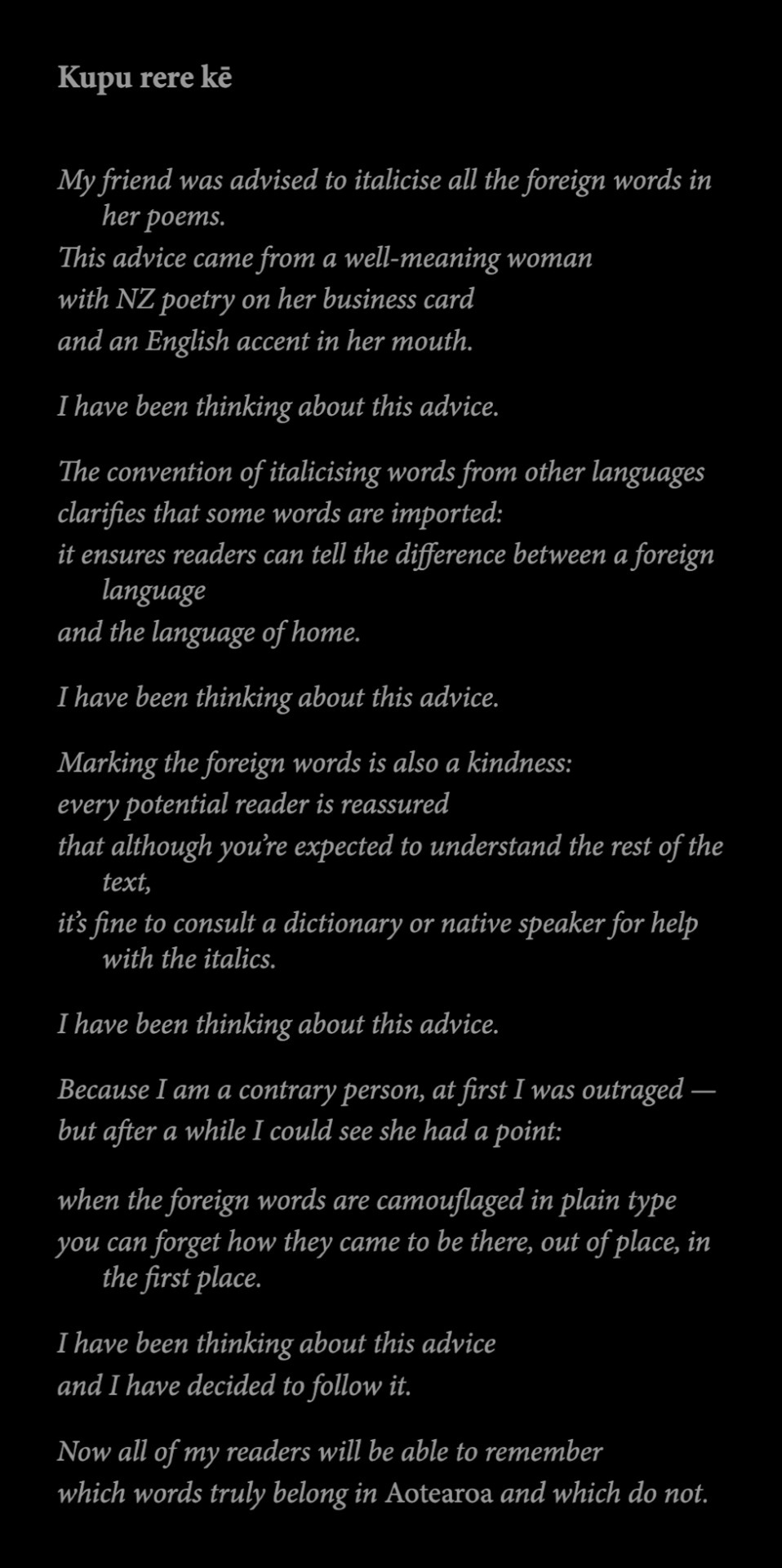#Kupu rere kē
Text

Alice Te Punga Somerville, Always Italicise: How to Write While Colonised - Kupu rere kē
[ID: A poem titled: Kupu rere kē. [in italics] My friend was advised to italicise all the foreign words in her poems. This advice came from a well-meaning woman with NZ poetry on her business card and an English accent in her mouth. I have been thinking about this advice. The convention of italicising words from other languages clarifies that some words are imported: it ensures readers can tell the difference between a foreign language and the language of home. I have been thinking about this advice. Marking the foreign words is also a kindness: every potential reader is reassured that although you're expected to understand the rest of the text, it's fine to consult a dictionary or native speaker for help with the italics. I have been thinking about this advice. Because I am a contrary person, at first I was outraged — but after a while I could see she had a point: when the foreign words are camouflaged in plain type you can forget how they came to be there, out of place, in the first place. I have been thinking about this advice and I have decided to follow it. Now all of my readers will be able to remember which words truly belong in -[end italics]- Aotearoa -[italics]- and which do not.
Next image is the futurama meme: to shreds you say...]
(Image ID by @bisexualshakespeare)

#powerful right off the bat#Alice Te Punga Somerville#Always Italicise#Always Italicise: How to Write While Colonised#new zealand poem#Always Italicise How to Write While Colonised#Kupu rere kē#aotearoa#quote#quotes#poem#poetry#Māori poetry#Māori#colonization#colonisation#Decolonisation#Te reo māori#Decolonization#new zealand#new zealand poetry
76K notes
·
View notes
Text
"My friend was advised to italicise all the foreign words in her poems."
Read it here | Reblog for a larger sample size!
#closed polls#polls#poetry#poems#poetry polls#poets and writing#tumblr poetry#have you read this#kupu rere kē#alice te punga somerville#māori poetry#te reo māori#admin faves
22 notes
·
View notes
Text

#powerful right off the bat#Alice Te Punga Somerville#Always Italicise#Always Italicise: How to Write While Colonised#new zealand poem#Always Italicise How to Write While Colonised#Kupu rere kē#aotearoa#quote#quotes#poem#poetry#Māori poetry#Māori#colonization#colonisation#Decolonisation#Te reo māori#Decolonization#new zealand#new zealand poetry
17 notes
·
View notes
Text
I just remembered, I put the Māori words in plain text and the English in italics when I write notes for the reo classes I teach. Reason for this is that the Māori is the focus, the important part, and the English is the background.
Interesting because although the reason for foreign words being in italics is presumably to differentiate them, my reasons for structuring the notes this way show that there are other implications when using italics.
2 notes
·
View notes
Text
I'm begging you, please stop italicising te reo Māori words in your fics.
There's a really excellent article by Khairani Barokka on why italicising non-English words in general is not a great idea. (tl;dr: it's very othering)
For te reo there's an additional reason, which is that most of us in Aotearoa stopped italicising te reo decades ago and now when we see it it looks fucking weird. It feels like you're holding the word with tongs; like you're saying "hey I found this weird foreign word and I don't really know what to do with it!"
Which is a pity, because there's some really good fics out there exploring Ed's Māori identity, and the italicising makes them look less good than they are. (I'm planning a specific recs post, but want it to be 100% positive, also there's stuff I haven't read yet.)
I don't want this to be a call out post, because I hate that shit, and I know that everyone's coming from a good place. If you've been italicising te reo words, you're probably doing what you were taught was the right thing, and I genuinely don't want you to feel bad about it. This is just a learning experience; go forth and use italics as they should be used in fan fiction:
"Oh. Oh."
PS I can't write about italicisation and te reo without mentioning the brilliant Alice Te Punga Somerville and the especially her poem Kupu rere kē.
544 notes
·
View notes
Text

"Kupu rere kē" by Alice Te Punga Somerville
from Always Italicise: How to Write While Colonised
#poetry#Alice Te Punga Somerville#sorry to repost someone's repost of this but i wanted a version to rb without like. a reaction gif#permanently attached to it
269 notes
·
View notes
Text

kupu rere kē by alice te punga somerville
71 notes
·
View notes
Text
2023 poetry rec list
technically a day late but who cares! i don't. it's gonna be a long one this year too despite not having read or written as much poetry as of late; i'm putting my overall fifteen favorite + poetry book recs up here and the rest below a cut to spare your dashboards :)
2022
2021
books:
calling a wolf a wolf (kaveh akbar)
cinema of the present (lisa robertson)
dictee (theresa hak kyung cha)
pilgrim bell (kaveh akbar)
prelude to bruise (saeed jones)
the crown ain't worth much (hanif abdurraqib)
top 15:
abecedarian requiring further examination of anglikan seraphym subjugation of a wild indian reservation (natalie diaz)
about eight minutes of light (robert king)
at luca signorelli's resurrection of the body (jorie graham)
ginen the micronesian kingfisher [i sihek] (craig santos perez)
gods, gods, powers, lord, universe-- (chen chen)
kupu rere kē (alice te punga somerville)
look (solmaz sharif)
ode to the 9,000 year old woman (@/goodbyevitamin)
one art (elizabeth bishop)
petitioning the patron saint of childbirth (danielle boodoo-fortuné)
so mexicans are taking jobs from americans (jimmy santiago baca)
the death loop (jon lovett)
the difficult miracle of black poetry in america: something like a sonnet for phillis wheatley (june jordan)
the madwoman as rasta medusa (shara mccallum)
vocabulary (safia elhillo)
& the gun echoed for centuries; interlude with drug of course; & the light devours us all (yasmin belkhyr)
a brother named gethsemane (natalie diaz)
a map to the next world (joy harjo)
between autumn equinox and winter solstice, today (emily jungmin yoon)
cherish this ecstasy (david james duncan)
coffins (derick thomson)
conflict resolution for holy beings (joy harjo)
failing and flying (jack gilbert)
ginen tidelands [latte stone park] [hagåtña, guåhan] (craig santos perez)
how to be a dog (andrew kane)
i love you to the moon & (chen chen)
i'm sorry birds (@/quezify)
insomnia and the seven steps to grace (joy harjo)
i was sleeping where the black oaks move (louise erdrich)
i watch her eat the apple (natalie diaz)
moth wings and other things (@/grendel-menz)
my father (ollie schminkey)
my soldier, my stranger (scherezade siobhan)
new year's day (joan tierney)
october (louise glück)
praise song for oceania (craig santos perez)
praise the rain (joy harjo)
real estate (richard siken)
sharing a cigarette with joan of arc (dante emile)
song of the anti-sisyphus (chen chen)
table (edip cansever, transl. richard tillinghast)
tear it down (jack gilbert)
temporary job (minnie bruce pratt)
the blue dress (saeed jones)
the lesson of the moth (don marquis)
the universe, as in one last song for the lonely hearts (michelle hulan)
throwing children (ross gay)
untitled (joan tierney)
voices (naomi shihab nye)
when i die i want your hands on my eyes (pablo neruda)
why i am not coming in to work today (jess zimmerman)
wolf moon (nina maclaughlin)
yes, it was the mountain echo (william wordsworth)
#2023#last post of the 2023 tag :)#here's to another year of gay poetry#to be is to be backlit#poems#poetry#croidhe#poetry recs#poetry rec list#writing
17 notes
·
View notes
Text
Kupu rere kē
My friend was advised to italicise all the foreign words in her poems.
This advice came from a well-meaning woman
with NZ poetry on her business card
and an English accent in her mouth.
I have been thinking about this advice.
The publishing convention of italicising words from other languages
clarifies that some words are imported:
it ensures readers can tell the difference between a foreign language
and the language of home.
I have been thinking about this advice.
Marking the foreign words is also a kindness:
Every potential reader is reassured
that although obviously you’re expected to understand the rest of the text,
it’s fine to consult a dictionary or native speaker for help with the italics.
I have been thinking about this advice.
Because I am a contrary person, at first I was outraged –
but after a while I could see she had a point:
When the foreign words are camouflaged in plain type
you can forget how they came to be there, out of place, in the first place.
I have been thinking about this advice and I have decided to follow it.
Now all of my readers will be able to remember which words truly belong in Aotearoa and which do not.
Alice Te Punga Somerville, Always Italicise: how to write while colonised
I saw this posted as an image with a reaction gif. (Credit: @words-and-coffee, without whom I would never have heard of this poem.)
But: it needs to be accessible.
It doesn't need a reaction gif.
It's powerful enough on its own.
16 notes
·
View notes
Text

Alice Te Punga Somerville, Always Italicise: How to Write While Colonised - Kupu rere kē
3 notes
·
View notes
Text
Alice Te Punga Somerville, Always Italicise: How to Write While Colonised - Kupu rere kē

0 notes
Text
Kupu rere kē
My friend was advised to italicise all the foreign words in her poems.
This advice came from a well-meaning woman
with NZ poetry on her business card
and an English accent in her mouth.
I have been thinking about this advice.
The convention of italicising words from other languages
clarifies that some words are imported:
it ensures readers can tell the difference between a foreign language
and the language of home.
I have been thinking about this advice.
Marking the foreign words is also a kindness:
every potential reader is reassured
that although you’re expected to understand the rest of the text,
it’s fine to consult a dictionary or native speaker for help with the italics.
I have been thinking about this advice.
Because I am a contrary person, at first I was outraged —
but after a while I could see she had a point:
when the foreign words are camouflaged in plain type
you can forget how they came to be there, out of place, in the first place.
I have been thinking about this advice
and I have decided to follow it.
Now all of my readers will be able to remember
which words truly belong in Aotearoa and which do not.
Alice Te Punga Somerville, Always Italicise: How to Write While Colonised - Kupu rere kē
#Alice Te Punga Somerville#A few people mentioned wanting a text version for accessibility...#powerful right off the bat#Always Italicise#Always Italicise: How to Write While Colonised#Always Italicise How to Write While Colonised#Kupu rere kē#aotearoa#colonization#colonisation#Decolonisation#Te reo māori#Decolonization#quote#quotes#poem#poetry#Māori poetry#Māori#new zealand#new zealand poetry#new zealand poem
582 notes
·
View notes
Note
11 for the not US ask!
Oh, I love this one, thanks pal!
11. favourite native writer/poet?
Oh gosh, easy answer! Alice Te Punga Somerville is an incredible poet. Kupu rere kē is amazing and I pull it out every Māori Language Week. Rākau is stunning. EVERYTHING she writes is incredible.
[“hi, I’m not from the US” ask set]
2 notes
·
View notes
Text

#powerful right off the bat#Alice Te Punga Somerville#Always Italicise#Always Italicise: How to Write While Colonised#new zealand poem#Always Italicise How to Write While Colonised#Kupu rere kē#aotearoa#quote#quotes#poem#poetry#Māori poetry#Māori#colonization#colonisation#Decolonisation#Te reo māori#Decolonization#new zealand#new zealand poetry
1 note
·
View note
Text

#powerful right off the bat#Alice Te Punga Somerville#Always Italicise#Always Italicise: How to Write While Colonised#new zealand poem#Always Italicise How to Write While Colonised#Kupu rere kē#aotearoa#quote#quotes#poem#poetry#Māori poetry#Māori#colonization#colonisation#Decolonisation#Te reo māori#Decolonization#new zealand#new zealand poetry
1 note
·
View note
Text

#powerful right off the bat#Alice Te Punga Somerville#Always Italicise#Always Italicise: How to Write While Colonised#new zealand poem#Always Italicise How to Write While Colonised#Kupu rere kē#aotearoa#quote#quotes#poem#poetry#Māori poetry#Māori#colonization#colonisation#Decolonisation#Te reo māori#Decolonization#new zealand#new zealand poetry#George R.R. Martin#motivation#literature#relationship quotes#writing#original#words#love#relationship
1 note
·
View note